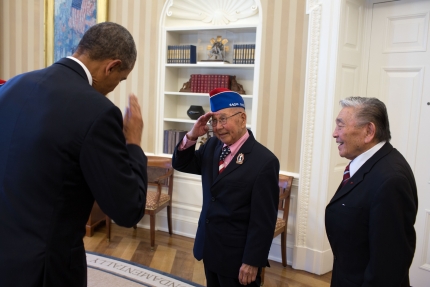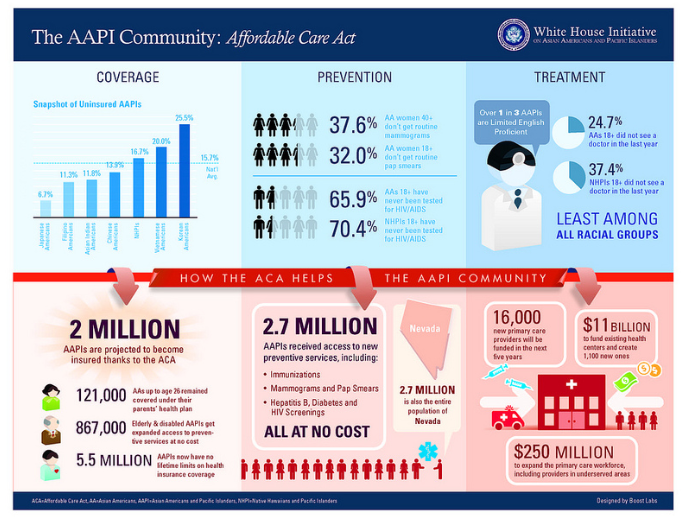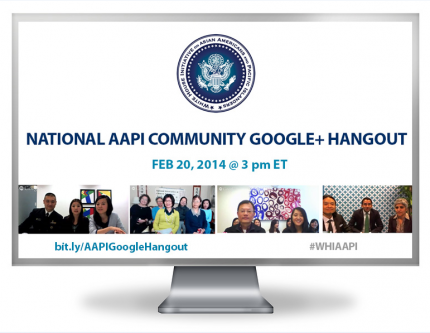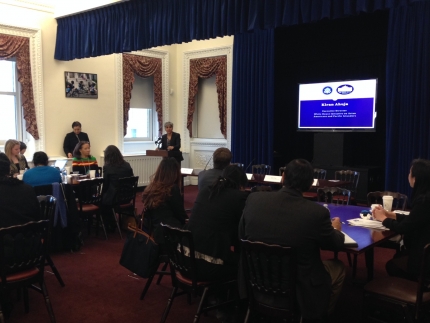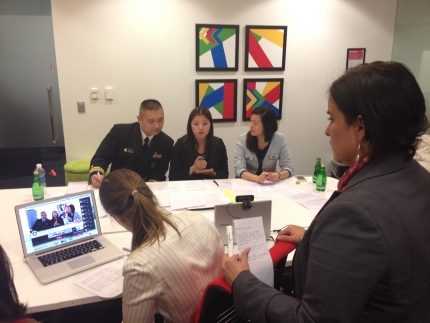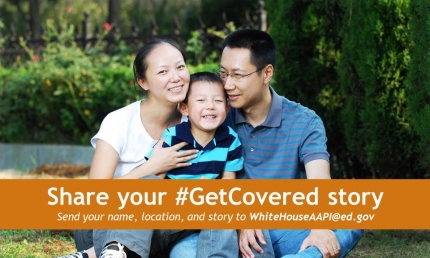Initiative on Asian Americans and Pacific Islanders Blog
President Obama Meets Japanese American World War II Veterans
Posted by on February 18, 2014 at 7:20 PM ESTOn February 19, 1942, following the attack on Pearl Harbor, President Roosevelt issued Executive Order 9066, leading the United States government to confine more than 100,000 people of Japanese descent in internment camps across the United States. Almost two-thirds of those incarcerated were United States citizens.
Despite tremendous prejudice and the internment of their families, more than 33,000 second-generation Japanese Americans (nisei) volunteered to serve in the United States Army during World War II – most notably, in the 100th Infantry Battalion, 442nd Regimental Combat Team, one of the most decorated units of World War II, and the Military Intelligence Service.
In 2010, over 65 years later, Congress passed and President Obama signed into law legislation awarding the Congressional Gold Medal – one of the highest civilian awards in the United States – to thousands of these veterans, finally recognizing the sacrifices they made for their country.
Today, the President met with seven of these surviving veterans, all in their 90s, to thank them in person for their service.
Learn more:
- Honoring the Legacy of Fred Korematsu
- President Obama Awards the Presidential Medal of Freedom to Gordon Hirabayashi
- President Obama Awards the Presidential Medal of Freedom to the Late Senator Daniel Inouye
- An Awe-Inspiring Chapter of America’s History
- Confession of Error: The Solicitor General’s Mistakes During the Japanese-American Interment Cases
And for more background, read about the Smithsonian Institute exhibit, American Heroes: Japanese American World War II Nisei Soldiers and the Congressional Gold Medal
Gautam Raghavan is an Advisor in the White House Office of Public Engagement.
Learn more about VeteransNominate a White House Champion of Change for AAPI Affordable Care Act Outreach
Posted by on February 12, 2014 at 4:45 PM ESTFor too long, many members of the Asian American, Native Hawaiian, and Pacific Islander community have lacked access to quality, affordable health care. Consider this: one in four Korean Americans is uninsured; nearly 40% of Asian American women over the age of 40 don’t get routine mammograms; one in four Asian Americans over the age of 18 – and one in three Native Hawaiians and Pacific Islanders – have not seen a doctor in the last year.
The Affordable Care Act provides an opportunity to provide nearly two million uninsured Asian Americans and Pacific Islanders with quality, affordable health care – but these individuals won’t gain access to affordable health care unless they know about the benefits of the Act and how to enroll for coverage.
Since open enrollment in the Health Insurance Marketplace kicked off on October 1, 2013, thousands of community advocates, direct service providers, and community based organizations have stepped up to help AAPIs gain access to health insurance, many for the first times in their lives. They have knocked on doors, educated their friends and neighbors, and helped individuals and families enroll through HealthCare.gov.
The dedication, commitment, and passion of these “Champions of Change” is worth celebrating – and that’s why we need your help!
We’re asking YOU to nominate an individual or organization as a “White House Champion of Change” for their work to educate AAPIs on the Affordable Care Act. You can nominate Affordable Care Act navigators or consumer assisters, direct service providers, staff of community-based organizations, and other individuals or entities that have focused their Affordable Care Act outreach and enrollment efforts on ensuring that AAPIs will fully benefit from health reform. We need your help to nominate the leaders and heroes who have developed best practices that contributed to the success of Affordable Care Act outreach for the AAPI community.
There are three main categories that you can nominate someone for:
- Educators, Assisters, and Navigators. Recognizing individuals who have gone above and beyond the call of duty to educate, assist, and enroll AAPI individuals and families. Their efforts have helped AAPIs understand the Affordable Care Act and ensured that they benefit from this historic law.
- Emerging Community Leaders. Individuals and organizations focused on emerging communities, for example, small, rural, and newly immigrated AAPI communities. These leaders have gone the extra step to ensure that limited English proficient, newly arrived immigrant and refugee families, and AAPI individuals in locations without access to navigators able to provide in-language support, can learn about and enroll in health insurance plans.
- Expert Communicators. Individuals who have developed top-notch outreach and communication strategies to ensure that AAPIs can read, hear, and learn about the benefits of the Affordable Care Act. Their communications strategies included activities such as developing in-language resources, developing written, oral, and media-friendly materials, and working with community groups, faith communities, and ethnic media to reach AAPI communities across the country.
When sending in your nominations, please describe the individuals and communities that the Champion of Change has helped, providing as much detail as possible. In addition, make sure to highlight the best practices they used to be creative, effective, and impactful in their Affordable Care Act education, outreach, enrollment, and/or communication efforts.
Nominate an AAPI Affordable Care Act Outreach Champion of Change
NOTE: Nominations are now due no later than Wednesday, March 5, 2014.
Gautam Raghavan is an Advisor in the White House Office of Public Engagement.
National AAPI Community Google+ Hangout: February 20
Posted by on February 11, 2014 at 12:08 PM ESTPlease join the White House Initiative on Asian Americans and Pacific Islanders (WHIAAPI), as well as government, civic and business leaders from across the country on Thursday, February 20, 2014 at 3 PM ET for our National AAPI Community Google+ Hangout!
Building on key topics highlighted in President Obama’s State of the Union address, we’ll discuss national priorities for AAPI communities and launch a drive to engage the AAPI community. We’ll also announce new efforts we’re working on with our partners around critical issues facing the AAPI community.
White House and Administration officials will talk about what we’ve learned and done nationally, and our next steps. Konrad Ng, Director of the Smithsonian Asian Pacific American Center, will announce this year’s AAPI Heritage Month theme. And, most importantly, we’ll have an opportunity to hear from people like you.
You can submit questions anytime on Twitter using #WHIAAPI, email them to WhiteHouseAAPI@ed.gov, or submit them on Google+ before or during the Hangout, but the inaugural National AAPI Community Google+ Hangout depends on your thoughtful participation, so please sign-up and join the conversation.
NATIONAL AAPI COMMUNITY GOOGLE+ HANGOUT
Hosted by the White House Initiative on Asian Americans and Pacific IslandersDATE: Thursday, February 20, 2014
TIME: 3 p.m. ET (12 noon PT)
LINK: http://bit.ly/AAPIGoogleHangout
Kiran Ahuja is Executive Director of the White House Initiative on Asian Americans and Pacific Islanders.
Increasing Federal Agency Outreach to Limited English Proficient Communities
Posted by on February 7, 2014 at 9:29 AM ESTLast week, the White House Office of Public Engagement and White House Initiative on Asian Americans and Pacific Islanders (WHIAAPI) convened a day-long summit for federal agencies to discuss how to improve outreach to limited English proficient (LEP) communities.
Executive Order 13166 – “Improving Access to Services for Persons with Limited English Proficiency” – requires federal agencies to examine the services they provide, identify any need for services to LEP individuals, and develop and implement a system to ensure meaningful access. And the statistics are compelling: 1 in 3 AAPIs is LEP. Being LEP means you are less likely to seek medical care; report positive health care experiences; or even access government economic opportunities such as small business loans.
Language access has been a priority from day one at WHIAAPI. When the President signed the Executive Order reestablishing WHIAAPI, he stated, “No community should be invisible to its government”. This statement has been WHIAAPI’s guiding light. In April 2010, less than 4 months after I became Executive Director, the BP Oil Spill devastated the Gulf Coast, affecting thousands of people, including hundreds of Southeast Asians who have lived in the Gulf for decades and made their living off the waters of the Gulf Coast. WHIAAPI deployed staff to the Gulf to address the concerns and needs of the AAPI community impacted by the spill. As a result, the first federal-wide language translation clearinghouse was established, in which all materials produced for the oil spill were translated into seven languages.
Since then, in partnership with the Department of Justice and other agencies, we have made great progress around language access. Agencies have increased the number of in-language publications, done inventories of bilingual staff, created video vignette training series, or built stronger ties to ethnic media.
And for many of us, it is personal. Many of the federal employees at the summit said they have family or friends who speak another language other than English at home, and many said they have had to translate or interpret for family members. As the Census has shown, more than 57 million people speak a language other than English at home.
We are also particularly proud of WHIAAPI’s recent series of in-language Google+ Hangouts on the Affordable Care Act for top AAPI LEP populations with the highest rates of being uninsured: Korean, Vietnamese, and Chinese. Google+ Hangouts can be a low-cost and extremely effective alternative to reaching a large number of AAPIs who are LEP. What is great about these Hangouts is that community members can continue to access themas an important federal resource.
At the summit, we challenged our federal partners to do even more for AAPI LEP communities, such as translating additional documents in AAPI languages, hosting an in-language Google Hangout, or thinking creatively on how we can share resources across federal agencies.
We know that in a few short decades, the AAPI population will double. My hope is that together, we stay ahead of this curve, and live by the ideals espoused by our President, “that no community should be invisible to its government” and that the federal government - and its many resources and services - should not be invisible to LEP communities.
Kiran Ahuja is Executive Director of the White House Initiative on Asian Americans and Pacific Islanders.
Learning about the Health Insurance Marketplace in Chinese (Mandarin)
Posted by on February 6, 2014 at 10:12 AM ESTOn January 23, 2014, the White House Initiative on Asian Americans and Pacific Islanders (WHIAAPI) held a Google Hangout in Chinese to discuss the Health Insurance Marketplace. Viewers tuned in from around the country, and Chinese American community groups gathered in California, Georgia, Missouri, Pennsylvania, and Texas to participate in the discussion.
The Department of Health and Human Services’ Winnie Cheung and Jerry Zee responded to a broad array of questions about the Health Insurance Marketplace, which opened on October 1, including eligibility requirements, enrollment start dates, authorized navigators, and resources for in-language assistance.
This Google Hangout is part of WHIAAPI’s larger series of in-language Google Hangouts, aimed at filling the tremendous need of educating limited English proficient populations on the Affordable Care Act. WHIAAPI has hosted similar educational Hangouts in Korean and Vietnamese.
Nearly 1 in 5 Asian Americans and Pacific Islanders (AAPIs) do not have health insurance. Two million AAPIs are projected to become insured thanks to the Affordable Care Act. For AAPIs, the law’s benefits will help reduce disparities in both health care and health outcomes through expanded insurance coverage and better access to high-quality health care services.
The turnout at the Chinese-language Google Hangout and the enthusiasm of the participants shows the importance of engaging with the AAPI limited English proficient community on the Affordable Care Act in the languages they speak.
Audrey Buehring is the Deputy Director at the White House Initiative on Asian Americans and Pacific Islanders.
了解医疗保险市场 (中文版)
一场关于白宫亚太裔计划 (WHIAAPI) 的中文 Google 环聊将在 2014 年 1 月 23 日举行,讨论 医疗保险市场 (Health Insurance Marketplace)。来自全国各地的受众和美籍华人社区团体云集在加利福尼亚州,佐治亚州,密苏里州,宾夕法尼亚州和得克萨斯州,以便加入讨论。
在 10 月 1 日,卫生及公共服务部的 Winnie Cheung 和 Jerry Zee 针对一系列关于医疗保险市场的问题做出了回答,包括资格要求、登记开始日期、授权的导航和各个语种的帮助资源。
Google 环聊是 WHIAAPI 较大规模的各语种 Google 环聊的一部分,旨在满足英语水平有限族群对《平价医疗法案》的巨大需求。WHIAAPI 已经在韩国和越南举行过类似的教育环聊。
大约有五分之一的亚裔美国人和太平洋岛民 (AAPIs) 没有医疗保险。两百万的亚裔美国人和太平洋岛民因《平价医疗法案》而加入计划,成为投保群体。对于亚裔美国人和太平洋岛民而言,在扩大了承保范围并优化高品质的医疗保健服务的提供之后,法律给予的福利将有助于减少医疗保健和医疗结果的差异。
中文 Google 环聊的出席者和参与者的热情体现了英语程度有限的 AAPI 群体以他们各自的母语共同学习《平价医疗法案》的重要性。
Audrey Buehring 现就职于白宫亚太裔计划的副处长。
用中文了解健康保險交易市場
2014年1月23日,亞裔美國人和太平洋島民白宮倡議 (WHIAAPI) 舉行了一場中文Google環聊,就健康保險交易市場進行討論。觀眾從全國各地收看了轉播,華裔美國人社區聚集在加州、喬治亞州、密蘇里州、賓州和德州參與了此項討論。
來自衛生及人類服務部門的Winnie Cheung 及 Jerry Zee回覆了各式各樣關於健康保險交易市場的問題,該市場於10月1日啟用,問題包含合乎投保資格的條件為何、加入的開始日期、合格的領航員以及各語言的資源協助。
此次Google 環聊是WHIAAPI 一系列各語言Google環聊的一部分,目標是針對滿足英語能力有限人口對平價健康法案了解的廣大需求。WHIAAPI也已經以韓語及越南語舉行過類似的教育環聊。
幾乎每五個亞裔美國人及太平洋島民(AAPIs)中就有一個沒有健康保險。預計會有兩百萬的AAPIs可以透過平價醫療法案獲得保險。對於AAPIs而言,此項法律的福利將透過擴充的保險承保以及更好的優質健保服務管道,來協助降低健康保險以及健康成果兩者的不均等。
此次中文Google環聊的成果以及參與者的熱情,顯示了以大家自已的母語與AAPI英語能力有限社群交流的重要性。
Audrey Buehring在亞裔美國人和太平洋島民白宮倡議中擔任副主任。
Learn more about Health CareShare Your Story and Help AAPIs #GetCovered
Posted by on February 4, 2014 at 3:25 PM EST"The bottom line is I'm going to need you, and the country needs you. And a lot of your friends and peers, they may not know that they need you, but if something happens somewhere down the road where they really need to get to a hospital or a doctor, the fact that you have talked to them and gotten them involved is going to make all the difference in the world." — President Obama at the Affordable Care Act Youth Summit, Dec. 4, 2013
An estimated two million uninsured Asian Americans and Pacific Islanders are eligible for health insurance coverage thanks to the Affordable Care Act (ACA) – but these individuals won’t gain access to affordable health care unless they know about the benefits of the ACA and how to enroll for coverage.
Since open enrollment kicked off on October 1, the White House Initiative on Asian Americans and Pacific Islanders has continued efforts to reach and engage the AAPI community. Community members have stepped up across the nation to lead efforts to spread the word about the ACA and help fellow AAPIs with enrollment.
We recently heard about a Laotian family who came to America as refugees, with the hope of improving their lives. For 30 years, the father worked at the same job to provide for his family, but his children have met challenges in the job market. His daughter completed college, but has to make ends meet with a combination of temporary and factory jobs, none of which provide insurance. His son hasn't been able to find a steady job. Both faced mounting medical bills, but were previously denied for Medicaid because their minimal incomes were considered too high.
Thanks to the ACA, the family now has access to essential health care they couldn’t afford before. Because they live in Illinois—a state that expanded its Medicaid program—they now qualify for Medicaid.
While many AAPIs, like this family, are benefitting from the ACA, we don’t hear about it enough. Do you have a story of your own to share? Maybe you’ve signed up for coverage or helped someone enroll, or maybe you’ve talked to your friends, family or coworkers about how the ACA can help them – let us know. Send your name, location, and story to us at WhiteHouseAAPI@ed.gov. Sharing your #GetCovered story could help other people learn about why it’s important to get health insurance coverage and how to do it.
If you need health insurance coverage, check out your options for quality, affordable coverage and sign up by visiting HealthCare.gov, by calling 1-800-318-2596, or find someone who can help you in person at localhelp.hhs.gov.
Note: Stories submitted to WHIAAPI may be treated as public information. For example, the stories, along with your name, may be featured on WhiteHouse.gov and HHS.gov and posted on White House and HHS social media channels. We may also provide them to national leaders, members of the press or other individuals outside of the federal government.
Juliet Bui is Policy Advisor on Health at the White House Initiative on Asian Americans and Pacific Islanders.
Learn more about Health Care
- &lsaquo previous
- …
- 19
- 20
- 21
- 22
- 23
- 24
- 25
- 26
- 27
- …
- next &rsaquo
White House Blogs
- The White House Blog
- Middle Class Task Force
- Council of Economic Advisers
- Council on Environmental Quality
- Council on Women and Girls
- Office of Intergovernmental Affairs
- Office of Management and Budget
- Office of Public Engagement
- Office of Science & Tech Policy
- Office of Urban Affairs
- Open Government
- Faith and Neighborhood Partnerships
- Social Innovation and Civic Participation
- US Trade Representative
- Office National Drug Control Policy
categories
- AIDS Policy
- Alaska
- Blueprint for an America Built to Last
- Budget
- Civil Rights
- Defense
- Disabilities
- Economy
- Education
- Energy and Environment
- Equal Pay
- Ethics
- Faith Based
- Fiscal Responsibility
- Foreign Policy
- Grab Bag
- Health Care
- Homeland Security
- Immigration
- Innovation Fellows
- Inside the White House
- Middle Class Security
- Open Government
- Poverty
- Rural
- Seniors and Social Security
- Service
- Social Innovation
- State of the Union
- Taxes
- Technology
- Urban Policy
- Veterans
- Violence Prevention
- White House Internships
- Women
- Working Families
- Additional Issues
